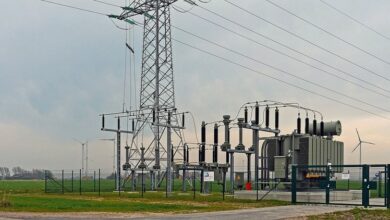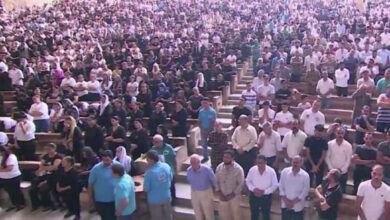At least one person was killed and dozens injured on Wednesday when police and Coptic demonstrators clashed over the construction of a church in a poor neighborhood south of Cairo densely populated by Christians.
Nearly one thousand Coptic Christians staged protests in the Al-Omraneyya neighborhood after police halted construction of a new church, according to eyewitnesses.
Mena Zarif, a priest at the Church of Saint Mena in the same neighborhood and the cleric in charge of overseeing construction of the neighboring church, said that 5000 riot police had attacked workers at 3:00 AM with tear gas and live ammunition.
He went on to assert that five people had been killed.
“It was a barbaric act,” Zarif told Al-Masry Al-Youm. “The police acted as if they were Israel and we were [Palestinian resistance faction] Hamas. What they're doing is similar to what Israel is doing with Hamas.”
The Interior Ministry, for its part, contends that only one person was killed, pointing out that several policemen, including senior officers, had been injured in the melee.
According to a police source quoted by official news agency MENA, more than 3000 protesters had attacked police with Molotov cocktails. The source added that 93 demonstrators had been arrested.
As of press time, the Health Ministry reported 76 injuries.
Rami Karim, a 22-year-old driver who participated in the protest, acknowledged the use of violence by Christian demonstrators. “After we held our rally at the church, we went to the governor's office and threw stones, glass and Molotov cocktails,” he said.
Restrictions imposed on church construction constitute a longstanding bone of sectarian contention that has occasionally led to violence in the past.
Copts, who constitute nearly ten percent of Egypt’s total population of 80 million, have consistently complained about the bureaucratic hurdles they face in obtaining building permits for new churches.
“If it were a mosque, everybody would have facilitated the construction process,” 25-year-old Copt Peter Sabri told Al-Masry Al-Youm.
Today’s disturbances come in the wake of several months of mounting sectarian tension over the alleged conversion of Christian women to Islam, along with incendiary statements made recently by a Coptic bishop about the Quran.
“What happened today is unprecedented,” said Bahey al-Din Hassan, director of the Cairo Institute for Human Rights Studies. ”For the first time, thousands of angry Christians took to the street to target state institutions. In the past, they would demonstrate inside churches or at their cathedral.”
“Copts have exhausted all means of voicing their grievances,” Hassan added, listing the aspects of perceived discrimination against Copts, including restrictions on church building and under-representation in public offices.
Amid today’s turmoil, Giza Governor Sayed Abdel Aziz convened a news conference at which he told reporters that construction of the church had been suspended because Copts had violated the conditions laid down in the building permit. He went on to say that the Coptic cathedral had obtained a permit to build an administrative structure, not a church.
“On 22 November, they built a dome for a church, prompting the head of Al-Omraneyya neighborhood to halt construction,” Abdel Aziz told journalists.
But this did not dissuade Copts from holding the state directly responsible for the sudden eruption of violence.
“The government is responsible for this sectarian strife,” said Adel Kamal, another Copt, standing a safe distance from from the controversial edifice. “Is all this happening simply because we want to build a church?”
As plainclothes police attempted to disperse the crowds, hundreds of the neighborhood’s roughly 90,000 Copts rallied at the gates of another nearby church, holding pictures of Jesus aloft and shouting, “With soul and blood, we will protect the cross,” and, “We want our church.”
Notably, today’s standoff comes only days ahead of Egypt's highly-anticipated parliamentary elections, slated for Sunday. The run-up to the polls has already been marred by violent clashes between police and campaigners for the Muslim Brotherhood opposition movement.
According to Hassan, mounting sectarian tension could end up working in the favor of the ruling regime.
“The government will benefit from these disturbances, which will distract the attention of the international media away from the elections,” said Hassan.
“I'm not suggesting a conspiracy here," he added. "But I can't rule it out as a possibility.”




